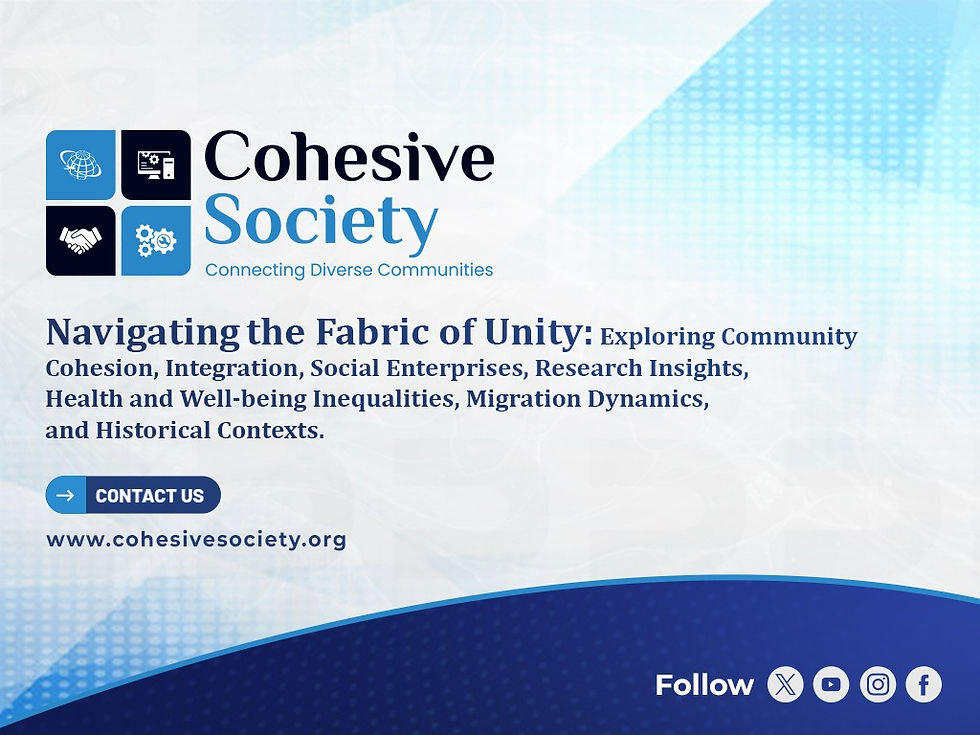Breaking the Silence: Mental Health Taboos in BAME Communities
- Cohesive Society

- Feb 6, 2024
- 3 min read
Updated: Mar 29, 2024

Introduction
Mental health has long been a stigmatised and taboo subject in many societies, but within Black, Asian, and Minority Ethnic (BAME) communities in the UK, the issue is compounded by cultural norms, historical factors, and a lack of open dialogue. The suppression of mental health concerns in these communities has led to a growing crisis that demands urgent attention and targeted solutions. In this blog, we will explore the challenges faced by BAME individuals in the UK, the roots of mental health taboos, and the crucial steps towards breaking the silence.
The Silent Struggle:
BAME communities in the UK often find themselves caught between the cultural expectations of resilience and the harsh reality of mental health challenges. Mental health issues are frequently misunderstood, misattributed, or dismissed within these communities. The pressure to conform to societal expectations and a fear of being labelled as weak or 'crazy' often make individuals suffer in silence.
Cultural and historical Factors:
Cultural and historical factors play a significant role in shaping attitudes towards mental health within BAME communities. Migratory experiences, discrimination, and racism can contribute to a sense of isolation and trauma. Traditional beliefs about mental health, passed down through generations, may view it as a sign of personal weakness rather than a medical condition requiring attention.
Suppression and the Cycle of Stigma:
The suppression of mental health discussions within BAME communities perpetuates a vicious cycle of stigma and ignorance. Lack of awareness and education about mental health issues further isolates those struggling and prevents them from seeking the help they need. This cycle can result in delayed or inadequate treatment, exacerbating the severity of mental health conditions.
The Importance of Diagnosis and Treatment:
One crucial step towards addressing mental health issues in BAME communities is early diagnosis and effective treatment. Culturally sensitive mental health services that understand and respect the unique experiences of individuals from diverse backgrounds are essential. Encouraging access to professional help can break the cycle of suppression and stigma.
Open Dialogue and Community Acceptance:
Breaking the silence surrounding mental health requires fostering open dialogue within BAME communities. Establishing safe spaces for discussions, both online and offline, can create an environment where individuals feel comfortable sharing their experiences. Community leaders, influencers, and healthcare professionals can play a pivotal role in normalising conversations around mental health.
Shaping Social and Community Acceptance:
Social and communal acceptance are fundamental to dismantling mental health taboos. This involves challenging stereotypes, debunking myths, and promoting positive narratives about mental health within BAME communities. Education programs and campaigns tailored to address cultural nuances can help reshape attitudes towards mental health and encourage empathy and understanding.
Cultural Competence in Mental Health Services:
To effectively support BAME individuals, mental health services must be culturally competent. This involves training healthcare professionals to understand and respect diverse cultural perspectives, values, and communication styles. By tailoring treatments to individual needs, mental health professionals can bridge the gap between conventional healthcare and the specific requirements of BAME communities.
Conclusion:
The mental health crisis within BAME communities in the UK is a complex issue rooted in cultural, historical, and societal factors. Breaking the silence requires a multi-faceted approach that includes open dialogue, community acceptance, and culturally competent mental health services. By addressing these challenges head-on, we can work towards a future where mental health is prioritised, destigmatised, and embraced within BAME communities. It's time to break free from the chains of silence and create a society that supports the mental well-being of all its members.



Comments